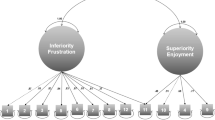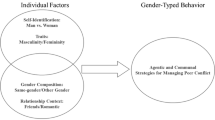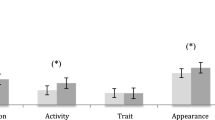Abstract
Previous research in sex-role identity has explored behavioral differences in a variety of contexts. Only recently, however, have differences in interaction style been investigated. The study reported here was designed to assess behavioral differences in one important type of interaction: interpersonal conflict. Of 143 college students responding to the Bem Sex-Role Inventory (BSRI), a final sample of 57 subjects provided questionnaire data on five conflict-management modes in hypothetical conflicts with others who varied on factors of sex and affective relationship with respondent. Results of the MANOVA analysis suggested that feminine persons disapprove of competition more than persons of masculine and androgynous sex-role identification. The results further suggested that masculine persons may differentiate less between liked and disliked others in their competitive behavior than do feminine and androgynous persons. Finally, results suggested that conflicts with liked, as opposed to disliked, others are managed with less competition and more accommodation, collaboration, and compromise for all sex-role identity groups.
Similar content being viewed by others
References
Altman, I., & Taylor, D. A. Social penetration: The development of interpersonal relationships. New York: Holt, Rinehart & Winston, 1973.
Apfelbaum, E. On conflicts and bargaining. In L. Berkowitz (Ed.), Advances in Experimental Social Psychology, 1974, 7, 103–156.
Bem, S. L. The measurement of psychological androgyny. Journal of Consulting and Clinical Psychology, 1974, 42, 155–162.
Bem, S. L. Sex-role adaptability: One consequence of psychological androgyny. Journal of Personality and Social Psychology, 1975, 31, 634–643.
Bem, S. L., & Lenney, E. Sex typing and the avoidance of cross-sex behavior. Journal of Personality and Social Psychology, 1976, 33, 48–54.
Bem, S., Martyna, W., & Watson, C. Sex typing and androgyny: Further explorations of the expressive domain. Journal of Personality and Social Psychology, 1976, 34, 1016–1023.
Block, J. H. Conceptions of sex role: Some cross-cultural and longitudinal perspectives. American Psychologist, 1973, 28, 512–526.
Costrich, N., Feinstein, J., Kidder, L., Maracek, J., & Pascale, L. When stereotypes hurt: Three studies of penalties for sex-role reversals. Journal of Experimental and Social Psychology, 1975, 11, 520–530.
Filley, A. C. Interpersonal conflict resolution. Glenview, Ill: Scott, Foresman, & Co., 1975.
Fink, C. Some conceptual difficulties in the theory of social conflict. Journal of Conflict Resolution, 1968, 12, 412–459.
Finn, J. A general model for multivariate analysis. New York: Holt, Rinehart, & Winston, 1974.
Gregovich, R. P. Sex differences in the PD game. Unpublished doctoral dissertation, University of Oregon, 1968.
Hall, J. Conflict management survey. Houston: Telemetrics, Inc., 1969.
Harré, R. Some remarks on “rule” as a scientific concept. In T. Mischel (Ed.), Understanding other persons. Oxford: Basil Blackwell, 1974.
Hottes, J. H., & Kahn, A. Sex differences in a mixed motive conflict situation. Journal of Personality, 1974, 42, 260–275.
Hummel, T., & Sligo, J. Empirical comparison of univariate and multivariate analysis of variance procedures. Psychological Bulletin, 1971, 76, 49–57.
Kagan, J. Acquisition and significance of sex-typing and sex-role identity. In M. L. Hoffman & L. W. Hoffman (Eds.), Review of Child Development Research, Vol. 1. New York: Russell Sage Foundation, 1964, 137–167.
Kahn, A., Hottes, J. H., & Davis, W. L. Cooperation and optimal responding in the PD game: Effects of sex and physical attractiveness. Journal of Personality and Social Psychology, 1971, 17, 267–279.
Kilmann, R. H., & Thomas, K. W. Interperpersonal conflict-handling behavior as reflections of Jungian personality dimensions. Psychological Reports, 1975, 37, 971–980.
Leary, T. The theory and measurement methodology of interpersonal communication. Psychiatry, 1955, 18, 147–161.
Maccoby, E. E. (Ed.). The development of sex differences. Stanford: Stanford University Press, 1966.
Nunnally, J. C. Psychometric theory. New York: McGraw-Hill, 1967.
Parsons, T., & Bales, R. F. Family, socialization, and interaction process. Glencoe, Ill.: Free Press, 1955.
Rossiter, C. M., Jr., & Pearce, W. B. Communicating personally: A theory of interpersonal communication and human relationships. Indianapolis: The Bobbs-Merrill Co., 1975.
Schmidt, S., & Kochan, T. Conflict: Toward conceptual clarity. Administrative Science Quarterly, 1972, 17, 359–371.
Spence, J. T., Helmreich, R., & Stapp, J. Ratings of self and peers on sex-role attributes and their relation to self-esteem and conceptions of masculinity and femininity. Journal of Personality and Social Psychology, 1975, 32, 29–39.
Thomas, K. W., & Kilmann, R. H. Thomas—Kilmann conflict mode instrument. XICOM, Inc., 1974.
Watzlawick, P., Beavin, J., Jackson, D. Pragmatics of human communication. New York: Norton, 1967.
Wilmot, W. W. Dyadic communication: A transactional perspective. Reading: Addison-Wesley, 1975.
Wyer, R. S., Jr., & Malinowski, C. Effects of sex and achievement level upon individualism and competitiveness in social interaction. Journal of Experimental and Social Psychoogy, 1972, 8, 303–314.
Zeldow, P. B. Psychological androgyny and attitudes toward feminism. Journal of Consulting and Clinical Psychology, 1976, 44, 150.
Author information
Authors and Affiliations
Rights and permissions
About this article
Cite this article
Baxter, L.A., Shepherd, T.L. Sex-role identity, sex of other, and affective relationship as determinants of interpersonal conflict-management styles. Sex Roles 4, 813–825 (1978). https://doi.org/10.1007/BF00287701
Issue Date:
DOI: https://doi.org/10.1007/BF00287701




